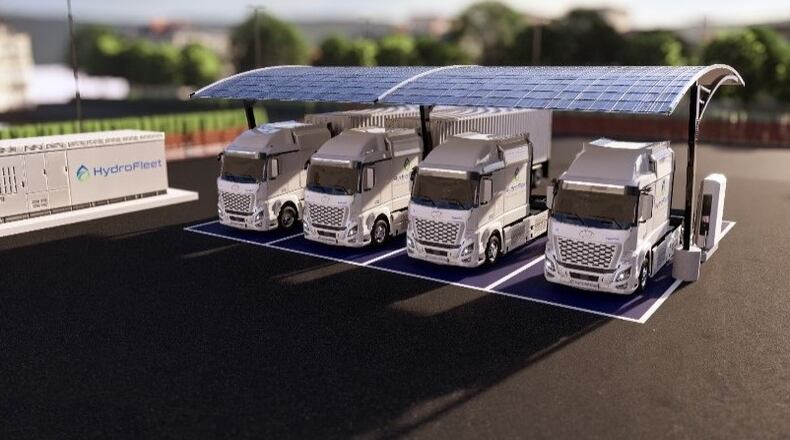Hydrogen-powered semitrucks are now navigating roads along Georgia’s coast, ferrying supplies and goods from the state’s ports to inland auto factories and construction sites.
Just like their diesel counterparts, those trucks need places to refuel. A company announced Tuesday it will soon provide such a place.
North Carolina-based HydroFleet said it will invest nearly $33 million to build a hydrogen production and fueling station in the Savannah suburb of Pooler to service heavy-duty hydrogen fuel cell trucks. The company, which specializes in hydrogen equipment and fuel supplying, said the coastal Georgia refueling center will support dozens of trucks rumbling along the region’s interstates as an environmentally friendly alternative to diesel.
“We know customers want zero-emission fleets but have struggled to source the entire hydrogen ecosystem at a price that is competitive,” HydroFleet CEO Scott Moe said in a news release. “Through strategic partnerships and proven safe technology, HydroFleet solves this challenging industry problem.”
The Pooler location will be close to Hyundai Motor Group’s $7.6 billion electric vehicle factory in Bryan County, which is already tapping into hydrogen power for its trucking fleet. In December, the Korean automaker deployed 21 of its XCIENT hydrogen fuel cell trucks to transport materials from Georgia’s ports to its plant, which began operations in October.
Credit: Courtesy Hyundai Motor Group
Credit: Courtesy Hyundai Motor Group
Hydrogen power has caught the attention of Georgia leaders who see the emerging technology as a potential game changer in clean energy shipping and green logistics. Georgia has emerged as a leader in e-mobility, battery and EV production, and the development of a “hydrogen highway” through the Peach State has piqued the interest of Georgia’s economic development brass.
“HydroFleet’s hydrogen refueling and production facilities are a critical link in building out infrastructure for the industrial use of hydrogen fuel cell technology,” Georgia Department of Economic Development Commissioner Pat Wilson said in a statement.
Hydrogen is an abundant element, but to be used as fuel it needs to be isolated from other compounds. The environmental benefits depend on how the hydrogen is produced — more than 90% of hydrogen produced today is derived from fossil fuels, while “green” hydrogen is produced using renewable energy, according to the U.S. Department of Energy. But vehicles fueled by hydrogen produce far fewer tailpipe emissions.
In hydrogen fuel cells like the ones powering the new trucks, hydrogen molecules are split into protons and electrons to create a flow of electricity, much like in a battery.
Credit: Courtesy Savannah Economic Development Authority
Credit: Courtesy Savannah Economic Development Authority
Founded in 2016, HydroFleet has delivered more than 450,000 kilograms of hydrogen gas to power semis, buses, forklifts and hydrogen-powered passenger vehicles. The new Pooler facility will initially refuel up to 14 trucks a day and will have a future daily capacity to serve 50 trucks.
“The advanced technology that HydroFleet employs to provide hydrogen for forklifts and heavy trucks is truly amazing and the trucks make hardly any noise, reducing noise pollution and have zero emissions,” Trip Tollison, the Savannah area’s top economic development official, said in the release.
About the Author
Keep Reading
The Latest
Featured





